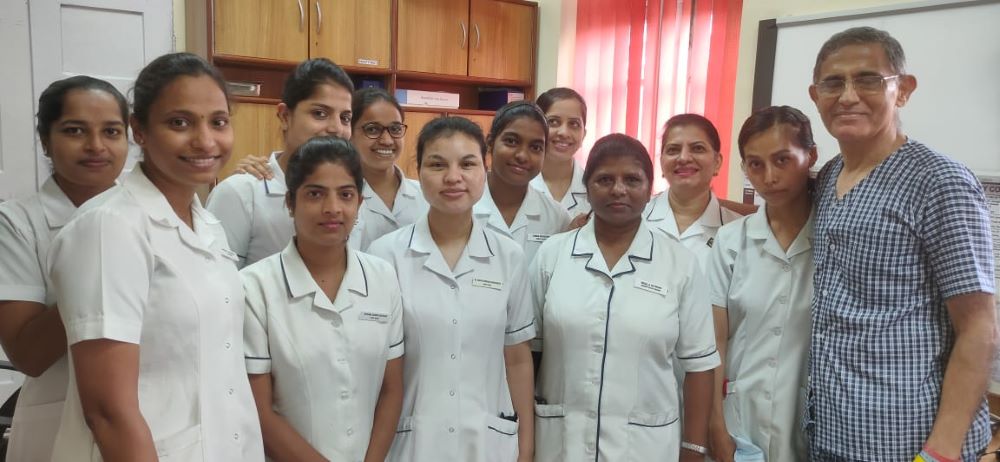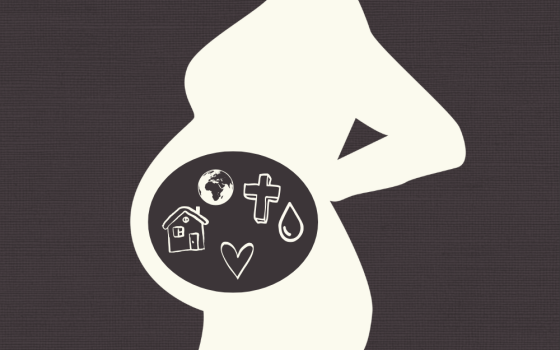
Sr. Rexilla Raymond, front row, third from right, is pictured with co-workers at Breach Candy Hospital in Mumbai, India, where she serves as a senior staff nurse. (Courtesy of Rexilla Raymond)
As a religious, I was given many professional choices to serve humanity. But from childhood, I had always heard glorious things about Florence Nightingale and had seen nurses in hospitals with their white angelic uniforms and white caps. That was the starting point of my dream to become a nurse.
In the hospital where I work as a staff nurse, we celebrated International Nurses Day on May 12. This year, I suddenly became aware that my call as a nurse is a "call within a call" and that I play an irreplaceable role in the healing ministry of Jesus.
From its origins, professional nursing arose from Christian-based values and principles. Ethical codes of the nursing profession, including the International Council of Nurses' Code of Ethics for Nurses (2021) emphasize that nursing care must promote an environment in which the human rights, values, customs, religious and spiritual beliefs of the individual … are acknowledged and respected by everyone.
Synodality, understood as a pilgrim journey, has helped me integrate my nursing service with faith in Jesus, the wounded healer. Every day, I strive to care for the spiritual, emotional and social needs of patients alongside their physical needs, aligning with the holistic approach central to nursing ethics.
The three pillars of the synod on synodality — communion, participation and mission — are foundational to consecrated religious life. Whether we are aware or not, we are breathing them in and breathing them out. I also consider these pillars the basics of my nursing profession. When the synodal process began, I began to see my daily life as a nurse through the synodal perspective and found inspiration in these three pillars.
I see every patient — with their illness and struggles to pay medical bills — as a fragment of the Divine.
As a nurse, I strive to be a source of comfort, companionship and hope to those in my care. Listening to patients with empathy reminds me to pay attention to the guidance of the Holy Spirit within me. Through synodality, I have also experienced better communication and collaboration with fellow nurses, doctors and other health care professionals, including office staff.
Providing dedicated care to the patients entrusted to me becomes my participation in the suffering of Jesus in the human body. This mission has helped me to go beyond simply providing competent professional health care. It has guided me to care for patients in a more personal, spiritually grounded way. I strive to bring compassionate love to every person who is suffering while maintaining my own inner strength. One of the central ethics of nursing is the commitment to serve and bring healing to others, an approach that aligns well with Catholic health care principles.
I have come to see my nursing profession as an ecumenical journey in a multi-religious, multicultural setting. Here, my presence reflects a participatory church that is open and receptive to change. This environment invites me to grow continually in walking with others — by listening to one another, sharing in mission and engaging in dialogue.
I have learned to pay attention to each patient's personal, interpersonal and relational religious and cultural beliefs and practices. I now recognize that a lack of respect for these can hinder holistic healing, and a lack of compassion can prevent spiritual healing. Around the world, nurses' interest in spiritual care is increasing.
Approaching nursing through a synodal lens, I consistently recognize the importance of spiritual comfort and value the fundamentals of a holistic approach without making distinctions based on religion or culture. Across the nursing profession, rigorous efforts continue to integrate spiritual support as an essential part of a nurse's role — rooted not necessarily in organized religion, but part of the patient's inner journey.
Advertisement
Benedictine Sr. Joan Chittister once said, "Once we realize that we are surrounded by fragments of the Divine, life becomes luminous." I see every patient — with their illness and struggles to pay medical bills — as a fragment of the Divine. In caring for them, I also receive a gift: Their struggles and darkness lead me into my own soul-searching inner journey, deepening my faith in the Poor of Yahweh, the Anawim.
A parable I once read spoke to me deeply. The Holy One said to an industrialist, "As the fish succumbs to death on dry land, so you succumb to death when you are trapped in the world. Just as a fish must return to the water to live in fullness, so must humans return to the divine source within." Horrified, the industrialist asked, "Are you saying that I must give up my business and go into a priory?" The Holy One replied, "Oh no, never. I am saying, 'Hold on to your industries but go deeper into the cave of your heart.' "
Diving deeper into my own heart, I am reminded that we have only one life and must make the best of it. I dream of serving on the front lines of patient care, offering relief and hope in the most vulnerable situations. Florence Nightingale earned the title "The Lady with the Lamp" through her tireless rounds to care for the sick and wounded. I may not earn such a title, but through my small efforts, I hope to light a lamp of hope and keep it shining (Matthew 5:15).




